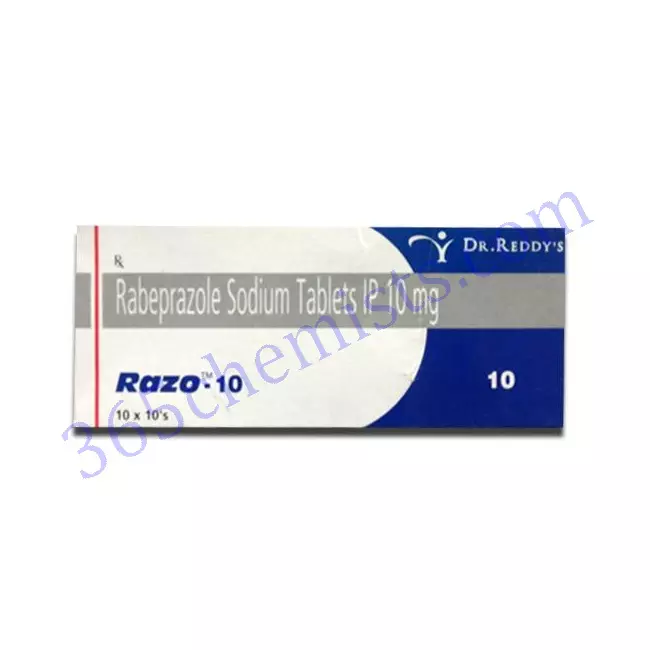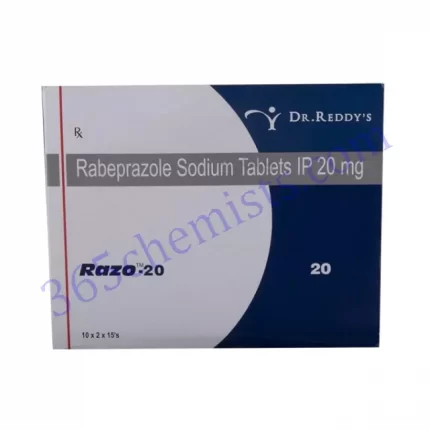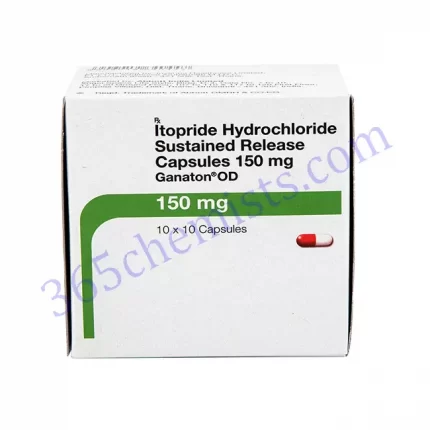Razo 10mg Tablet
The drug Razo 10 mg Tablet contains the active component rabeprazole, which is a member of the proton pump inhibitors (PPIs) pharmacological class. The majority of its applications are for the treatment of gastrointestinal disorders such Zollinger-Ellison syndrome, GERD, and peptic ulcers. Razo 10mg Tablet relieves symptoms brought on by too much stomach acid by lowering the amount of acid produced in the stomach.
How It Works
The proton pump in the stomach lining is specifically inhibited by the action of Razo 10mg Tablet. The last phase of producing stomach acid is carried out by this pump. Rabeprazole works to relieve symptoms of heartburn, acid reflux, and stomach ulcers by decreasing the quantity of acid discharged into the stomach. The treatment is successful in relieving these symptoms and accelerating the repair of injured digestive system tissues.
Dosage and Administration
Oral administration of one Razo 10 mg tablet should be done before each meal. The tablet shouldn’t be chewed, crushed, or broken; it should be eaten whole with a glass of water. The precise dosage and length of the course of treatment will depend on the ailment being treated and how each patient responds. It’s crucial to adhere to the doctor’s directions and not take more medication than what is recommended.
Related product
Razo 10mg Tablet
Razo 20mg Tablet
Razo D Capsule
Razo L Capsule
Precautions and Side Effects
It’s crucial to let your doctor know if you have any allergies, medical conditions, or prescription medications before taking Razo 10mg Tablet. Some people might have minor side effects like headaches, vertigo, nausea, or diarrhoea. Most of the time, these side effects are transient and go away on their own. However, it’s crucial to get medical help if they linger or get worse. More severe side effects, like severe allergic responses or liver issues, can occasionally happen. It’s crucial to get prompt medical help if you have any strange symptoms.
Contraindications
People who have a known hypersensitivity to rabeprazole or other proton pump inhibitors should not take Razo 10 mg Tablet. It shouldn’t be taken with some drugs, such as nelfinavir and atazanavir, because it might prevent their absorption. Women who are pregnant or nursing should speak with their doctor before taking this medicine. Before beginning therapy, it’s crucial to go over any possible dangers and advantages with your healthcare provider.
Drug Interactions
Razo 10mg Tablet may interact with several medicines, changing their efficacy or raising the possibility of negative side effects. All of the medications you are taking, including prescription, over-the-counter, and herbal supplements, should be disclosed to your healthcare physician. Some drugs, such as warfarin (an anticoagulant), some antifungal drugs, such as ketoconazole and itraconazole, and some antiviral drugs, such as atazanavir and nelfinavir, may interact with Razo 10mg Tablet. If there are any possible drug interactions, your healthcare professional can help you identify them and change your treatment strategy accordingly.
Warnings and Precautions
It’s crucial to go over your medical history and any underlying illnesses with your healthcare professional before taking Razo 10 mg Tablet. If you have liver illness, osteoporosis, low magnesium levels, or other drug allergies, let your doctor know. In particular, those who take high doses or use the drug for extended periods of time may experience an increased risk of bone fractures when taking Razo 10mg Tablet. If you are at risk for osteoporosis or have a history of bone fractures, it is advisable to go over the potential dangers and advantages of Razo 10mg Tablet with your doctor.
Storage and Handling
Store Razo 10mg Tablets at room temperature, away from heat and moisture. Keep children and pets away from the drug. Beyond the expiration date mentioned on the container, do not use Razo 10mg Tablet. For advice on how to properly dispose of any unused or expired medication, speak to your chemist or healthcare practitioner.
Conclusion
The medicine Razo 10mg Tablet is frequently recommended to treat gastrointestinal disorders brought on by too much stomach acid. By lowering the formation of stomach acid, it aids in the relief of symptoms like heartburn, acid reflux, and stomach ulcers. It is crucial to take Razo 10mg Tablet exactly as directed and in accordance with your doctor’s recommendations. Your healthcare professional should be informed of any worries or probable side effects, and any odd symptoms should be reported right once. You can successfully control your gastrointestinal symptoms and enhance your general well-being by taking Razo 10 mg Tablet as prescribed and in consultation with your healthcare professional.The medicine Razo 10mg Tablet is frequently used to treat gastrointestinal disorders brought on by high levels of stomach acid. It aids in symptom relief and encourages the healing of the digestive tract by lowering acid production in the stomach. It is crucial to adhere to the recommended dosage and instructions given by your healthcare provider, as well as to report any adverse effects or concerns as soon as possible. It is always advised to speak with a healthcare professional for individualised advice and assistance if you have any questions or concerns about using Razo 10mg Tablet.











